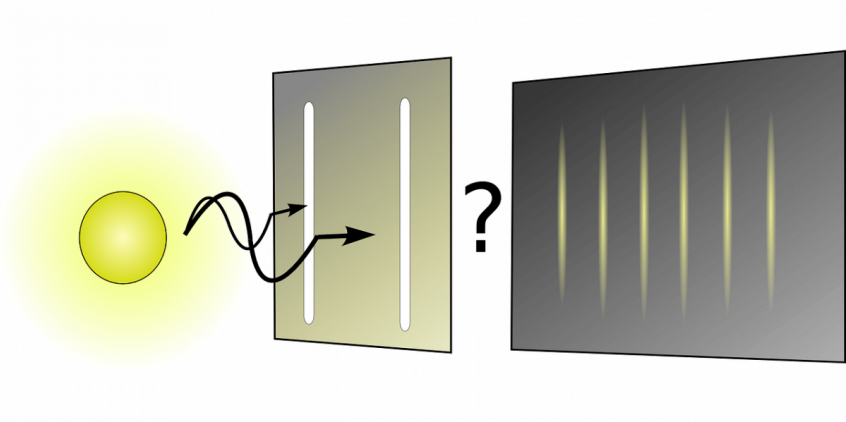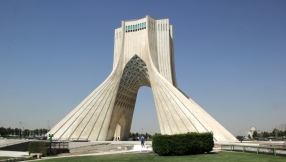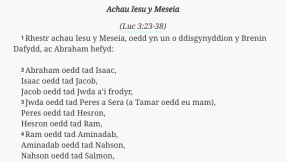Light is an extraordinary thing. Gaze out at a sunset over the sea, as the waves glint and a thousand shards pierce your retina. Watch the first rays of sun pierce through the clouds on foggy mornings, as a million particles of moisture are briefly illuminated before evaporating and giving way to clear air. Stand in silence before a painting by Vermeer or Turner or Constable and reflect on life's deep mysteries. Hide in a cupboard with members of your family and shine a torch underneath your chin, telling scary stories. Light is fascinating, uplifting, unquenchable. Light gives us warmth and sight. Light lies at the heart of what it means to be alive.
Light also has some extraordinary properties. A huge scientific battle has raged for decades now – is light made up of particles or waves? The scientific consensus has increasingly arrived at the most wonderful conclusion: perhaps it is both. After all, it seems to behave in ways that only a particle, or indeed only a wave, could. The truth, it turns out, might be stranger than we think. The truth might not be binary after all. Perhaps something that has the characteristics of both actually is both.

Flick through any religious text and you'll quickly discover that the concepts of light and truth are closely related. Light is the natural physical rendering of truth. Truth, like light, helps us to see plainly, guides us, banishes fear, and it is endlessly beautiful and fascinating. Ultimately, it makes us come alive. But like light, truth has extraordinary properties too. So often we discover that truth does not sit easily with binary conclusions. This or that. The one or the other. Either/or.
Real, lasting faith – you might say intentional faith – might just as easily be described as in-tension-al faith.
Binary schminary
The binary code of our digital age might power our computers but it does scant justice to matters of truth. True Christian maturity resides in the holding together of competing values – not either/or, but both/and.
In a sense, after 35 years as a Christian I'd prefer that this wasn't the answer I've arrived at. There's a part of me that would love life, and truth, and growth, to be simple. Do this one thing, try this one prayer, believe that one insight, and everything could be different. The blogosphere is full of such soundbites, and we gorge ourselves on them like intellectual protein shots. #happy!
The problem is, in my life – and perhaps yours too – the simplistic approach doesn't really work very well. A minor drawback, some of you may feel. But the reality that most of us experience, I believe, is that the truth is stranger, more mysterious, more complicated but ultimately more incredibly rich and wonderful than we could imagine.
Both/and thinking is a mature approach to truth. Both/and thinking is what we need in our individual lives if we are to grow into the people Jesus Christ wants and calls us to be. Both/and thinking is also what we desperately need in our churches, our communities, our government, our nation.
What The Big Idea is not
But please don't misunderstand me. Both/and thinking is not a life of muddy, tepid compromises, a kind of half-hearted, diet version of real faith. Quite the reverse. In the many tensions we meet on the journey of faith – some which are obviously polar opposites, others which prove to be practical tensions in everyday faith, all of which have some impact on how we follow Jesus – the 'solution' is to commit 100 per cent to both ends of the tension. Not either/or, not even half and half instead – but fully both. The glass is half empty and half full at the same time – fancy that!
In our community we have a traditional summer fair every June, and it comes with the whole works: cream teas, silly races for the kids – and the Competitive Dads – overpriced funfair, and so on. But the highlight each year is the end-of-afternoon tug-of-war. Round 1 starts with a game few, but by round 3 the whole community piles in. It's 50-a-side. It lasts for what seems like an eternity. More people fall over in a heap than on our local high street at midnight on Saturday evening. The Deep Heat shelf in our local Boots is empty the next day.

Imagine the rope in a tug-of-war. What makes for an exciting contest? Certainly not when there's only one team in the tournament, pulling away at one end while the other hangs limp. Nor is it particularly exciting when each team only pulls half-heartedly, though it makes for fewer trips afterwards to the medical tent by middle-aged, overweight men. What people want to see is two evenly matched teams, both pulling their end of the rope with all their might. Both/and thinking is like spiritual tug-of-war. Commit fully to both ends of the rope!
Nor is both/and thinking a way of valuing complexity for its own sake. One of my favourite stories is about Karl Barth, arguably the greatest theologian of the 20<sup>th century, who was once asked about his most significant theological insight. Barth thought for a moment, and then replied: 'Jesus loves me, this I know, for the Bible tells me so.' I love that story for its honesty, for its surprise, but also because it makes the point that following Jesus, at its heart, is very simple. As Canon Andrew White, the Vicar of Baghdad and a man under incredible pressure in his life and work, explained in an interview in 2009: 'I have a very childlike faith. I have never doubted. I have always loved Jesus, and I have always known he loves me. I listen to him and he listens to me. So we're friends.'
Amen to that. However I believe there is a difference between the heart of faith and the life of faith. The heart of faith is simple. The life of faith is complicated. Anyone who has been a Christian for a few years will have hit issues which they wrestle with, or dilemmas which they can't resolve easily. The life of faith in our uniquely complex modern world is particularly challenging. We need a mature faith now more than ever. The both/and life is not complicated for its own sake. It is just common-sense, mature discipleship.
The finished article?
What does it mean to be mature? Or rather teleios, which is the word both Jesus and Paul use for being all we could be in Christ – the real deal, the finished article? Here's a famous definition of the word from Philippians chapter 3:
'I want to know Christ and the power of his resurrection and the fellowship of sharing in his sufferings, becoming like him in his death, and so, somehow, attaining to the resurrection from the dead.'
Death and resurrection– this side of the grave, sort of simultaneously. What's that about? But we only have to look at the Book of Acts to see that it was absolutely Paul's day-to-day experience: both manifesting the tremendous resurrection power of Christ and at the same time sharing in Christ's very severe trials and sufferings.
Power and suffering, death and resurrection. It's a paradox: the more we die, the more we live; and, perhaps, the more we live, the more we die, as we face opposition from the flesh, the world and the devil to the life of Christ manifesting in us and the people around us. The in-tension-al life becomes our day-to-day experience.
And what is true for this tension between death and resurrection is, I believe, true for numerous other elements of what it means to follow Jesus daily: eternal life now and not yet, growth as both moment and journey, becoming more like Jesus and more like yourself, being reliant on God and personally responsible, grace and works, more holy and more loving, peace and battle – the list goes on....
To be a Christian is to live a life which accepts these tensions as not just a barrier to maturity, but the very means by which maturity is achieved. A life which finds power and purpose in holding tensions and competing values together. A life which is, perhaps, more complex and challenging but ultimately richer, deeper and more rewarding. A life which doesn't settle for either/or, but passionately pursues both/and.
Simplexity
Following Jesus is the most beautiful and gritty, liberating and all-consuming, obvious and bewildering thing any human being can do. It's what we were made for and yet utterly alien to our natural desires and inclinations. It is extraordinarily simple and absorbingly complicated.
I hope I never stop receiving Jesus like a child. But I also hope that I never stop trying to count the vast sum of his precious thoughts (Psalm 139:18), so that, in some very small way, aided by the Spirit, I can grasp the 'mind of Christ', enabling me to make wise judgments about all things(1 Corinthians 2:15-16) and be presented teleios to my glorious Father.
The finished article.
Rev Matt Trendall is Rector of Walton Churches Partnership, Milton Keynes.













